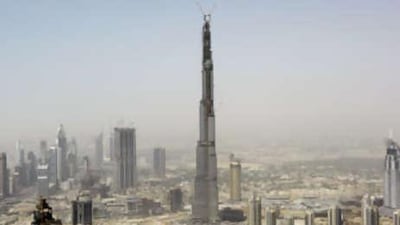Arabtec, the UAE's only publicly listed construction firm, yesterday announced a record second-quarter net profit of Dh273.6 million (Dh74m), up by more than 140 per cent on the same period last year. Riad Kamal, the chief executive, said the profit was driven by "the expansion strategy implemented by Arabtec, and acquisitions which focused on proper integration for large scale operations".
Through a number of recent acquisitions, Arabtec is becoming a vertically integrated construction business. It now owns Target Engineering, an Abu Dhabi-based company that specialises in civil, electrical and marine contracting, as well as Gulf Steel Industries, a steelmaker. Arabtec is one of the three contractors building the Burj Dubai, destined to be the world's tallest building. The company also acquired a 33 per cent stake in House of Equipment, a firm that rents construction equipment. Last week it revealed that it was close to finalising a joint-venture agreement with a major Malaysian construction firm. The two companies will establish a business specialising in piling and foundation, another key sector of the construction industry.
Arabtec announced a flurry of new contracts in the quarter, including its largest residential construction contract of this year, a Dh3 billion agreement to build 1,500 homes at the Al Furjan development in Dubai, a Nakheel project. In a note to clients, the investment bank Shuaa Capital said Arabtec's performance this year "has boosted their visibility and provided tangible evidence of the company's ability to expand into Abu Dhabi, the Middle East and other potentially lucrative markets".
In its biggest deal of the quarter, the company won a Dh10bn tender - its largest ever - to construct a 400 metre skyscraper and surrounding buildings in St Petersburg, Russia. The contract was awarded by a division of Gazprom, the largest company in Russia and the world's largest extractor of natural gas. Mr Kamal has previously said he hopes to see the company earning 40 per cent of its revenues from outside the UAE by the end of the decade. Arabtec now has Dh36bn worth of projects under construction in the UAE, Russia, Qatar, Jordan, Syria and Pakistan. The company recently suggested that an announcement regarding a new project in Saudi Arabia could be expected in the coming weeks.
Industry leaders estimate construction costs in the GCC have risen by 50 per cent this year, following a 30 per cent rise last year. And consumer price inflation in the region, running at over 15 per cent by some estimates, has led to a major labour shortage as would-be migrant construction workers stay at home. This is putting pressure on margins in the sector. Arabtec says it is bucking the trend through vertical integration and tight supply-chain management. At a recent investors' conference, the company said it had pre-purchased 12 months' worth of construction materials as a hedge against further inflation.
Company officials also said that 50 per cent of Arabtec's contracts were priced on a cost-plus basis, meaning rising prices had no impact on its profitability. A further 25 per cent include clauses that allow increases in the price of steel and cement to be passed on to the client. However, analysts are concerned that gross margins will fall because of Arabtec's large Russia project and planned forays into Europe, where margins are lower than in the booming Middle East.
"We expect gross margins to suffer an even further decline as contracting works in St Petersburg commence," said Emaar Saudi Financial Services in a recent research note. Al Mal Capital concurred, adding that the company would not enjoy the same close supply-chain relationships in Russia that it did in the UAE. But all three investment banks see the company as an undervalued growth stock. Arabtec's shares, traded on the Dubai Financial Market, have increased in value by more than 110 per cent this year. In the last 12 months, Bloomberg's US Home Builders index has declined by 30 per cent; the European index fell by 72 per cent.
@Email:tgara@thenational.ae

